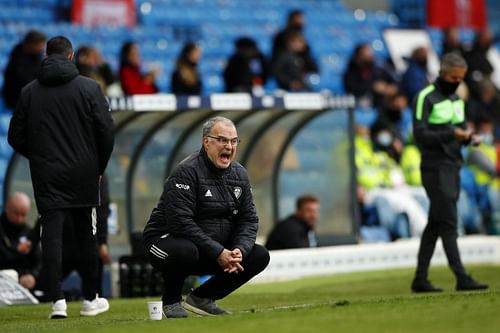
Leeds United and mid-blocks: What is Marcelo Bielsa's side lacking against mid-table sides?

"Another 4-4-2 mid-block side faced. Another draw earned." Leeds United podcaster Jon Mackenzie chose to say the facts when reviewing the Burnley draw earlier last weekend. Though Elland Road has seen some enthralling 'open games' in the last 365 days, times have been tough for Leeds when facing sides that have a clear agenda of walking away with a point or scoring on the counter.
One might argue that this 1-1 draw with Burnley was the first time these sides faced a stalemate since 1973, and the first time Leeds ended up with just a point in 26 games. But an eye test reveals how complacent Bielsa's side become as they enter the second half of such games.
The famous Murderball strategy that Bielsa trains his team with, week in, week out, is based on a simple principle; the ball being moved at a certain pace with a non-stop approach. When such a situation doesn't occur, the Premier League newcomers from last season face clear issues with how to progress the ball or score a goal.
Before Burnley opened the scoring on the hour-mark through Chris Wood, Leeds centre-backs were often seen making side-way passes. They couldn't make those line-breaking passes to find the attacking personnel. Their only outlet, it seemed, was Raphinha on the right-wing, who was being served the long ball, just for the Brazilian to squander his chances.
For the faithful at Elland Road, this isn't something new which has cropped up in the 2021-22 season.
Leeds' struggles with the ball at their feet

If only visual spectacles had filled the club's pockets, Leeds would have been atop the Premier League table last season. But that's clearly not the case in the result-oriented world of modern football.
Last season, Bielsa's men lost 13 of their 18 fixtures when they averaged more than 60% of possession during a game. This includes sides ranging from the likes of Liverpool and Tottenham to West Brom and Hull City in the Carabao Cup. 14 of these 18 fixtures were against sides who finished below them in the English footballing hierarchy.
Speaking of some advanced metrics, Leeds accumulated a total figure of 24.2 when it comes to Expected Goals (xG) in these 18 games, but scored only 22 goals during this period. We are talking about a side which usually scores surprising and unexpected goals which results in them over-performing their xG score. Clearly, having possession doesn't suit the side from West Yorkshire.
Problem lies in ball progression from deep

It seems strange that Leeds have evident problems progressing the ball from deep when they have one of the best midfielders in England - Kalvin Phillips. But the main issue that has gone under the sun is their central defenders' inability to progress the ball further up the field, sometimes even to their pivot players.
Leeds captain Liam Cooper, who started 25 games last season, progressed the ball in only 29.6% of his total passes in that period of time. The figures for his similarly positioned teammates, Ezgjan Alioski and Luke Ayling, were below 40% too. This is despite all the three players being in the top 50% of the progressive defenders in the league.
This signifies only one major issue - Leeds have not progressed just enough from their deeper positions, and still aren't. That's probably why they find it tough breaking down teams who deploy low-blocks against them on a regular basis.
Is it time Bielsa changes his system to have two pivots?

Europe witnessed a different version of Kalvin Phillips when he led his nation to the final of the 2020 European Championships earlier this summer. But is the proper box-to-box midfielder under Gareth Southgate being limited by his long-time mentor Marcelo Bielsa? The performances tend towards a positive affirmation.
Kalvin-Phillips played a single pivot for Bielsa and shifted between being a deep-lying playmaker and a fifth defender for Leeds during the defensive transition. He might be the best in that role when it comes to defending the ball, but this takes away a lot from the attacking facet of his game.
The only answer seems to be whether Bielsa can tweak his formation to play another defensively minded player alongside Phillips in the mix. This will not only allow the English midfielder some breathing space to show his creativity, but give some more options for the centre-backs to progress the ball through the middle.
Nevertheless, Leeds welcome the mighty Reds from Liverpool next, who are likely to help Bielsa's men be themselves and play the game they like to play. A top fixture at Elland Road awaits after the international break.